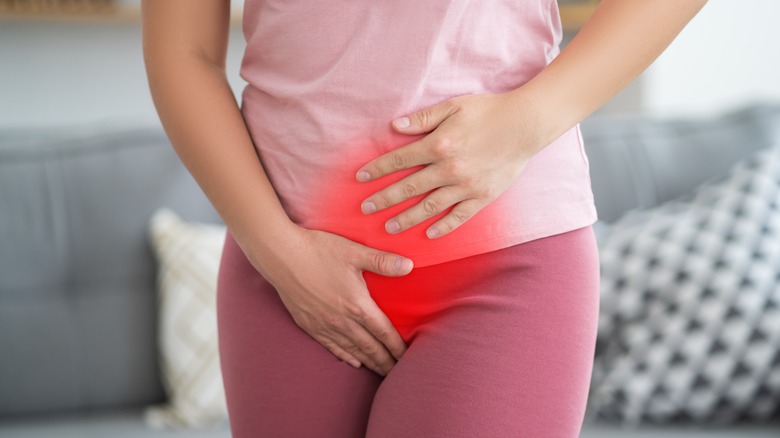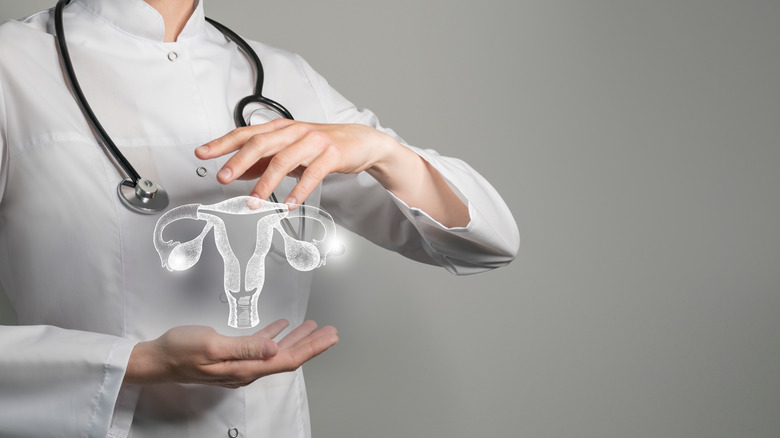What Is The Difference Between Endometriosis And PCOS?
The ovaries are a pair of reproductive organs located in the female pelvis. They are responsible for producing eggs, as well as hormones such as estrogen and progesterone (via Cleveland Clinic). According to the clinic, the ovaries are important because they play a central role in the menstrual cycle and fertility. During the menstrual cycle, an egg is released from one of the ovaries (a process called ovulation). If a sperm fertilizes the egg, it will implant in the lining of the uterus, and pregnancy will occur. If the egg is not fertilized, the uterine lining is shed during menstruation, and the cycle begins again, says the clinic.
The hormones produced by the ovaries also play important roles in a person's overall health. According to the University of California San Francisco, estrogen and progesterone help regulate the menstrual cycle and support pregnancy. Abnormalities of the ovaries can lead to a range of health problems, including ovarian cysts, endometriosis, polycystic ovary syndrome (PCOS), and other conditions that may require treatment (via the Agency for Healthcare Research and Quality).
Endometriosis versus PCOS: What is the difference?
Endometriosis and polycystic ovary syndrome (PCOS) are two separate and distinct conditions that affect the reproductive system. While both conditions can cause similar symptoms, they are distinct conditions with different causes and risk factors.
According to the World Health Organization, endometriosis is a chronic condition in which the endometrium (the tissue found in the lining of the uterus) grows outside the uterus. This tissue can grow on the ovaries, fallopian tubes, and other organs in the pelvis, per Mayo Clinic. Endometriosis can cause symptoms such as pelvic pain, heavy or irregular periods, and fertility problems and is thought to be caused by a combination of genetic and immune factors (via Johns Hopkins Medicine).
PCOS is a hormonal disorder that affects the ovaries. According to Mayo Clinic, it is characterized by the growth of multiple small cysts on the ovaries. Those with PCOS may have irregular periods, difficulty getting pregnant, excess hair growth, acne, and weight gain. It is thought to be caused by a combination of genetic and health factors, such as insulin resistance and inflammation.
How are endometriosis and PCOS treated?
According to the National Health Services (NHS), endometriosis is typically diagnosed through laparoscopic surgery. During the diagnosis, a healthcare provider will look for endometrial tissue growing outside of the uterus. PCOS is typically diagnosed based on symptoms, a pelvic exam, and blood tests to check hormone levels (via Healthline).
NHS writes that treatment for endometriosis may include medications, hormone therapy, and surgery. Nonsteroidal anti-inflammatory drugs (NSAIDs) such as ibuprofen can help reduce pain and inflammation. Hormonal therapies, such as oral contraceptives and gonadotropin-releasing hormone agonists (GnRH agonists), might also be prescribed, per Mayo Clinic).
Treatment for PCOS typically involves a combination of medications (to regulate hormone levels and improve fertility) and lifestyle changes (weight loss and exercise, and change in diet), according to Johns Hopkins Medicine. Medications used to treat PCOS may include oral contraceptives, metformin, and anti-estrogen medication, explains Mayo Clinic. If a person with PCOS is trying to get pregnant, her healthcare provider may prescribe medications such as clomiphene or gonadotropins to help stimulate ovulation.



